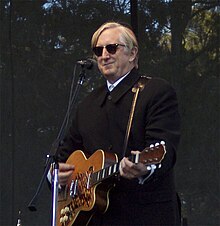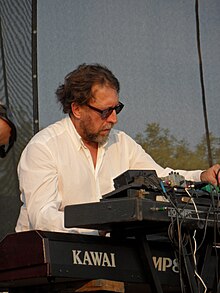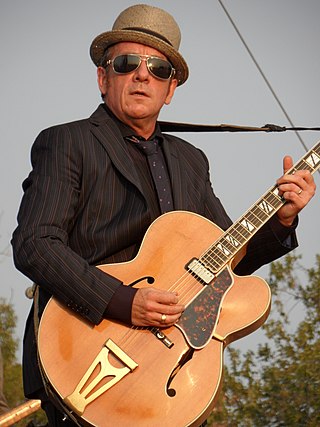
Declan Patrick MacManus, better known by his stage name Elvis Costello, is an English singer, songwriter, record producer, author and television host. According to Rolling Stone, Costello "reinvigorated the literate, lyrical traditions of Bob Dylan and Van Morrison with the raw energy and sass that were principal ethics of punk", noting the "construction of his songs, which set densely layered wordplay in an ever-expanding repertoire of styles." His first album, My Aim Is True (1977), spawned no hit singles, but contains some of Costello's best-known songs, including the ballad "Alison". Costello's next two albums, This Year's Model (1978) and Armed Forces (1979), recorded with his backing band the Attractions, helped define the new wave genre. From late 1977 until early 1980, each of the eight singles he released reached the UK Top 30. His biggest hit single, "Oliver's Army" (1979), sold more than 500,000 copies in Britain. He has had more modest commercial success in the US, but has earned much critical praise. From 1977 until the early 2000s, Costello's albums regularly ranked high on the Village Voice Pazz & Jop critics' poll, with This Year's Model and Imperial Bedroom (1982) voted the best album of their respective years. His biggest US hit single, "Veronica" (1989), reached number 19 on the Billboard Hot 100.

Almost Blue is the sixth studio album by the English singer-songwriter Elvis Costello, and his fifth with the Attractions—keyboardist Steve Nieve, bassist Bruce Thomas and drummer Pete Thomas. It was recorded in May 1981 in Nashville, Tennessee, and released in October the same year. A departure from Costello's previous works, it is a covers album composed entirely of country music songs, including works written by Hank Williams and George Jones. The project originated with Costello's desire to record a collection of covers after his two previous studio albums commercially underperformed following Armed Forces (1979).
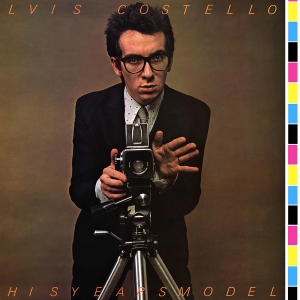
This Year's Model is the second studio album by the English singer-songwriter Elvis Costello, released on 17 March 1978 through Radar Records. After being backed by Clover for his debut album My Aim Is True (1977), Costello formed the Attractions—keyboardist Steve Nieve, bassist Bruce Thomas and drummer Pete Thomas —as his permanent backing band. Recording sessions took place at London's Eden Studios in eleven days between late 1977 and early 1978. Nick Lowe returned as producer, and Roger Béchirian acted as engineer. Most of the songs were written prior to the sessions, and debuted live during the latter half of 1977.

My Aim Is True is the debut studio album by the English singer-songwriter Elvis Costello, originally released in the United Kingdom on 22 July 1977 through Stiff Records. Produced by Stiff artist and musician Nick Lowe, the album was recorded from late 1976 to early 1977 over six four-hour studio sessions at Pathway Studios in Islington, London. The backing band was the California-based country rock act Clover, who were uncredited on the original release due to contractual difficulties. At the time performing as D.P. Costello, Costello changed his name to Elvis after Elvis Presley at the suggestion of the label, and adjusted his image to match the rising punk rock movement.
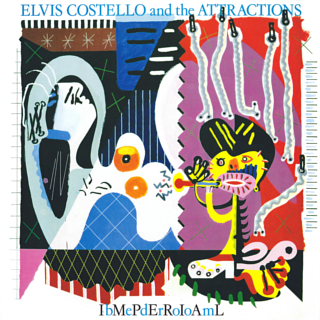
Imperial Bedroom is the seventh studio album by the English singer-songwriter Elvis Costello, and his sixth with the Attractions—keyboardist Steve Nieve, bassist Bruce Thomas and drummer Pete Thomas. It was released on 2 July 1982 through F-Beat Records in the United Kingdom and Columbia Records in the United States. Recording took place at AIR Studios in London from late 1981 to early 1982 with production handled by Geoff Emerick. Placing an emphasis on studio experimentation, the album saw the group use unusual instruments, including harpsichord, accordion and strings arranged by Nieve. Songs were rewritten constantly while Costello tinkered with the recordings, adding numerous overdubs.
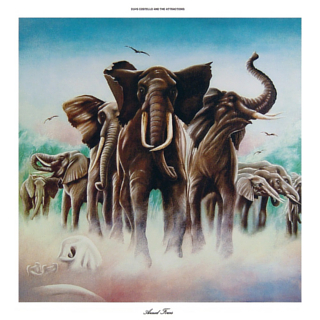
Armed Forces is the third studio album by the English singer-songwriter Elvis Costello, released on 5 January 1979 in the United Kingdom through Radar Records. It was his second album with the Attractions—keyboardist Steve Nieve, bassist Bruce Thomas and drummer Pete Thomas —and the first to officially credit them on the cover. The album was recorded in six weeks from August to September 1978 in London under the working title Emotional Fascism. Produced by Nick Lowe and engineered by Roger Béchirian, the sessions saw Costello exert more control over production compared to This Year's Model, while Nieve contributed more to song arrangements.

Mighty Like a Rose is the 13th studio album by the British rock singer and songwriter Elvis Costello, released in 1991 on compact disc as Warner Brothers 26575. The title is presumably a reference to the pop standard "Mighty Lak' a Rose", and although that song does not appear on the album, the words of its first stanza are quoted in the booklet of the 2002 reissue. It peaked at No. 5 on the UK Albums Chart, and at No. 55 on the Billboard 200.
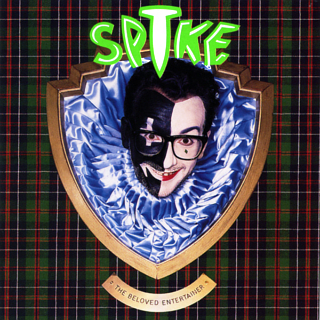
Spike is the 12th studio album by English singer-songwriter Elvis Costello, released in 1989 by Warner Bros. Records. It was his first album for the label and first release since My Aim Is True with no appearance by the Attractions. It peaked at No. 5 on the UK Albums Chart and also reached the Billboard 200 at No. 32, thanks to the single and his most notable American hit, "Veronica", which reached No. 19 on the Billboard Hot 100 and No. 1 on the US Modern Rock chart. In The Village Voice's annual Pazz & Jop critics poll for the year's best albums, Spike finished at No. 7.

Get Happy!! is the fourth studio album by the English singer-songwriter Elvis Costello, and his third with the Attractions — keyboardist Steve Nieve, bassist Bruce Thomas and drummer Pete Thomas. It was released on 15 February 1980 through F-Beat Records in the United Kingdom and Columbia Records in the United States. Produced by Nick Lowe and engineered by Roger Béchirian, the sessions began in London but moved to the Netherlands after Costello found the material derivative of his previous album, Armed Forces (1979). The sessions were problematic but resulted in a large number of songs; the final album contains 20 tracks across a single LP.

Punch the Clock is the eighth studio album by the English singer-songwriter Elvis Costello, and his seventh with the Attractions—keyboardist Steve Nieve, bassist Bruce Thomas and drummer Pete Thomas. It was released on 5 August 1983 through F-Beat Records in the United Kingdom and Columbia Records in the United States. Produced by Clive Langer and Alan Winstanley, the album was Costello's attempt at making a commercial record following years of dwindling commercial success. It was recorded at London's AIR Studios in early 1983 and features contributions from the TKO Horns and Afrodiziak.
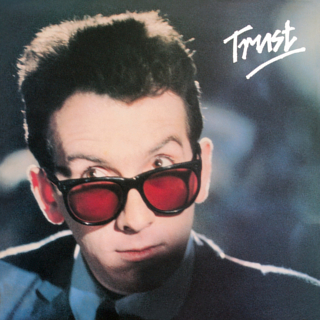
Trust is the fifth studio album by the English singer-songwriter Elvis Costello, and his fourth with the Attractions—keyboardist Steve Nieve, bassist Bruce Thomas and drummer Pete Thomas. It was released on 23 January 1981 through F-Beat Records in the United Kingdom. Produced by Nick Lowe, with assistance by the engineer Roger Béchirian, the album was recorded in London from October to November 1980 between DJM and Eden Studios. The sessions were riddled with alcohol and drug issues and tensions were high between the band members. Squeeze's vocalist Glenn Tilbrook and the Rumour's guitarist Martin Belmont made guest appearances on "From a Whisper to a Scream".

Blood & Chocolate is the eleventh studio album by the English singer-songwriter Elvis Costello, and his ninth album with the Attractions—keyboardist Steve Nieve, bassist Bruce Thomas and drummer Pete Thomas. It was released on 15 September 1986 through Demon and Columbia Records. After mostly using outside musicians for his previous album King of America, Costello reunited the Attractions and his former producer Nick Lowe for Blood & Chocolate. Recorded in London during a period of heightened tensions between Costello and the Attractions, the tracks were recorded quickly, mostly live in first takes, while the band were set up simultaneously in the same room at Olympic Studios. The Pogues' bassist Cait O'Riordan guested on multiple tracks.

King of America is the tenth studio album by the English singer-songwriter Elvis Costello, released on 21 February 1986. Co-produced by Costello and T Bone Burnett, the album originated following a series of tours the two made under the name "the Coward Brothers". Recording took place in mid-1985 at various studios in Los Angeles, California, with a group of American session musicians dubbed "the Confederates". Selected by Burnett, they included Ray Brown, Earl Palmer and former members of Elvis Presley's TCB Band. Costello's regular backing band, the Attractions, were intended to appear on half of the album before poor sessions led to them appearing on only one track, "Suit of Lights".
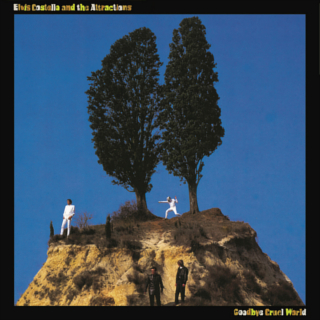
Goodbye Cruel World is the ninth studio album by the English singer-songwriter Elvis Costello, and his eighth with the Attractions—keyboardist Steve Nieve, bassist Bruce Thomas and drummer Pete Thomas. It was released on 18 June 1984 through F-Beat Records in the United Kingdom and Columbia Records in the United States. Produced by Clive Langer and Alan Winstanley, who returned from 1983's Punch the Clock, the album was recorded at London's Sarm West Studios in March 1984 during a period of turmoil for the artist. The problematic sessions included disagreements between Costello and the producers over the album's direction and high tensions amongst the Attractions.

The Delivery Man is the 21st studio album by Elvis Costello, released on 21 September 2004 through Lost Highway Records. It was recorded with the Imposters at Sweet Tea Studio in Oxford, Mississippi. It peaked at No. 40 on the Billboard 200.

"Blue Chair" is a song written by new wave musician Elvis Costello and recorded by Costello with his backing band the Attractions. The song first appeared on Costello's 1986 album, Blood & Chocolate. First intended for Costello's previous album King of America, the song was scrapped during that session and reworked with the Attractions around Steve Nieve's piano part.

"Brilliant Mistake" is a song by the English singer-songwriter Elvis Costello that was first released on his 1986 album King of America. Written about Costello's experiences in America, the song features introspective lyrics and a performance from the Confederates, who performed on the track after his usual backing band the Attractions could not perform to Costello's liking.
"Stranger in the House" is a song written by English musician Elvis Costello. Costello recorded the song as a duet with country music star George Jones in the summer of 1978 for Jones' 1979 album My Very Special Guests. Costello recorded an earlier solo version which surfaced as a free 7" single with the first 1000 copies of his second album This Year's Model which was released in the United Kingdom in March 1978. A third version was recorded with the Attractions for a John Peel session on 23 October 1978. According to Holly Jones-Warren's liner notes to the 2005 Legacy Records reissue of My Very Special Guests, Costello wrote the song specifically with Jones in mind, with the new wave star stating, "George Jones was my guiding light whenever I wrote in the country idiom".
"Suit of Lights" is a song written and performed by new wave musician Elvis Costello that was first released on his 1986 album King of America. Written about Costello's memories of his father, the song includes introspective lyrics about the "dubious embrace of celebrity" while also featuring the sole performance of the Attractions on the album, who were largely supplanted by the studio professionals of the Confederates on the rest of King of America.
"Indoor Fireworks" is a song by the English singer-songwriter Elvis Costello that was first released on his 1986 album King of America. Written as a eulogy for a broken relationship, the song utilizes a central metaphor of fireworks and took inspiration from Costello's failed marriage. On the song, Costello is supplemented by the studio professionals of the Confederates, as on most of King of America.
